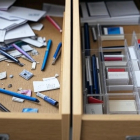Are You Drinking Water the Right Way? Your Energy Might Depend on It
We often think drinking water is straightforward: just drink when you’re thirsty. But what if the way you drink water is secretly reducing your energy, affecting your digestion, or making it harder to stay mentally sharp?
Recent findings show that timing, temperature, and technique all play important roles in how your body absorbs and uses water. By shifting just a few daily habits, you can transform something as simple as hydration into a consistent energy boost — without needing another cup of coffee.
✅ 1. Sip, Don’t Gulp — Let Your Body Absorb It
Dr. Andrew Huberman from Stanford University explains that when we gulp large amounts of water, the body tends to eliminate it quickly through urine, limiting its effectiveness. Sipping water gradually throughout the day helps maintain stable hydration levels and allows better absorption at the cellular level.
✅ 2. Begin Your Day With Warm or Room-Temperature Water
Drinking a glass of warm water first thing in the morning helps flush out overnight waste and activates your digestive system. According to research published in the Journal of Biological Chemistry, early hydration supports metabolism and restores balance after hours of sleep without fluids.
✅ 3. Avoid Overhydrating During Meals
Too much water during meals can dilute your stomach acid and interfere with digestion. The Mayo Clinic recommends limiting water intake during meals and instead drinking 30 minutes before or after to maintain proper enzyme function and prevent post-meal fatigue.
✅ 4. Hydrate Based on Your Activity
If you’re working out, walking in the sun, or sweating a lot, your hydration needs increase — but not just in terms of water. The American Journal of Clinical Nutrition notes that electrolytes lost through sweat, especially sodium and potassium, need to be replenished or you may still feel tired despite drinking enough water.
✅ 5. Choose the Right Temperature for Better Digestion
Warm water is often more easily absorbed and gentler on your stomach. A study from Acta Physiologica found that warmer liquids promote better blood flow and digestion, while very cold water may slow down internal processes and even trigger headaches in sensitive individuals.
✅ 6. Add Natural Electrolytes
Enhance your hydration by adding a squeeze of lemon or a pinch of sea salt. Harvard Health suggests that these simple additions help balance electrolytes and improve absorption, especially for those on low-sodium diets or active lifestyles.
✅ 7. Watch for Early Signs of Dehydration
Thirst is often a late indicator. According to the National Library of Medicine, signs like brain fog, fatigue, dry lips, or light-headedness may appear before you feel thirsty. Regular sips can help you avoid energy crashes caused by mild dehydration.
✅ 8. Make Water Easily Accessible
A study in the Journal of Behavioral Medicine found that people drink significantly more water when it’s in plain sight. Keeping a water bottle at your desk, in your bag, or near your bed increases the likelihood of consistent intake.
✅ 9. Use Timed Reminders or Habit Triggers
Setting gentle phone reminders or pairing hydration with existing habits — like drinking a glass every time you check email — helps you stay on track without overthinking it. Behavioral researchers at NIH have noted the effectiveness of these micro-habits in long-term hydration consistency.
✅ 10. Don’t Follow the “8 Glasses a Day” Rule Blindly
While commonly recommended, the “8 glasses” rule doesn’t suit everyone. According to the European Journal of Clinical Nutrition, your hydration needs depend on activity level, climate, and diet. Listening to your body — energy, focus, and urine color — is more reliable than a fixed number.
Drinking water is easy to do — but easy to overlook. By adjusting how, when, and what kind of water you drink, you can turn a basic habit into a powerful tool for daily energy and focus. Drink smarter, not just more 💧













